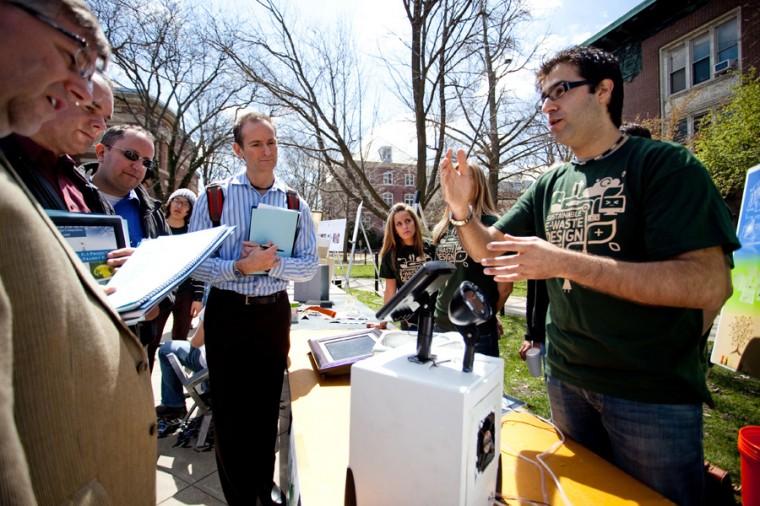Students devise new, creative ways to reuse electronics
Reza Shiftehfar, right, graduate student in Engineering, speaks with judges of the Sustainable E-Waste Design competition on the Quad on Thursday.
April 17, 2009
As technology progresses and times change, some students are finding ways to turn electronic trash into treasure.
Students exhibited novel ways of re-using old computers in front of Lincoln Hall on Thursday.
The students were from ART 326D, a class that focuses on sustainability and electronic waste, or e-waste.
The exhibition showed a variety of ways computers can be reused, including using them to make an e-garden and furniture.
Lubo Gruev, senior in FAA, and his team worked on a project which can be used in areas that do not have access to internet.
Get The Daily Illini in your inbox!
“We’ve devised a method to give people low-cost access to the internet,” Gruev said. “We will allow people to be able to access the internet without having a physical computer in their home, they would access it through a terminal.”
The class is interdisciplinary, so students from all academic sectors can enroll, said Marissa Dolin, teaching assistant for the course. Students at the event were from urban planning, architecture, industrial design and engineering backgrounds, among others.
“We are trying to keep the cycle going for as long as we can trying to delay these objects from ending up in a landfill,” said Eric Heyen, senior in Media.
He said he hopes that he can market sustainable-friendly ideas and products as a profession.
The teams at the event competed for prizes totaling $15,000, sponsored by companies such as Microsoft and Motorola. Dolin said each team had the opportunity to be judged in both the social and technical categories.
The course is co-taught by William Bullock, a professor in industrial design, and Willie Cade, the chief executive officer of PC Rebuilders and Recyclers.
Bullock said this was the first time they taught the class.
“I got really interested in the topic of electronic waste,” he added.
One of the primary motivators for this class, Bullock said, was to “learn about how we handle e-waste and understand the domestic and international aspects of this problem.”
The first semester of the class focused on researching the problems of e-waste, while the second semester focused on design and innovation, Dolin said.
“We were focused to find uses for things we were throwing in the trash,” Bullock said.
Five tons of old computer parts were donated for the project.
“These are some magnificent ideas to commercialize,” Cade said.
He added he wants students to try and take their ideas as far as they can.
The University plans to run a contest nationwide next year and the course will be taught again next spring, Cade said.







